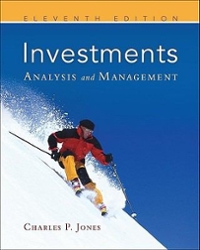Answered step by step
Verified Expert Solution
Question
1 Approved Answer
V . Accumulating Money Joseph reads a lot about people who are success oriented. He loves to learn about courage, risk taking, and as he
V Accumulating Money
Joseph reads a lot about people who are success oriented. He loves to learn about
courage, risk taking, and as he describes it "the road less traveled." His local bookstore
has a large business section where he has found biographies of entrepreneurs and
maverick corporate leaders. He also finds fascinating some of the books he has seen on
financial planning and ways to accumulate wealth. One interesting savings plan he read
about challenges the reader to put aside one full paycheck at the end of the year as a
"holiday present to yourself." Joseph had never thought about saving in that way, and
wondered if it would really accumulate much savings.
a He decided to test the numbers by seeing how much money he would
accumulate by a retirement age of if he put one paycheck away at the end of
each year. Right now, that would mean depositing $ at yearend for the
next years. Assuming he makes one yearly deposit of $ at
compounded annually, how much interest would he earn?
b Joseph was surprised at how large the sum would be and then realized that he
would be able to put more money away in future years because most likely, his
salary would go up He also thought that he could invest the money over the
long term at a higher interest rate, so he redid the calculations with a $
annual yearend deposit, at for years. What was his result?
c Joseph was amazed at how much he could save in this manner and decided to
design a detailed savings plan based on projected yearly increases. He realized
that he could not start depositing $ now, but that he would be able to
deposit more than that in the future. If he were able to deposit $ at the
end of each year for the next years at compounded annually, $ at the
end of years at compounded annually, and $ at the end of years
at compounded annually, how much would he accumulate at the end
of years? Assume that any balances from earlier depositing periods would
continue to earn the same rate of annual interest.
d By how much does the result differ from the amount calculated above for $
deposited for years? What accounts for the difference?
e If Joseph decided that he wanted to have $ accumulated in years by
making an annual payment at the end of each year that would earn
compounded annually, what would his sinking fund payment be Use the
appropriate table to determine the answer.

Step by Step Solution
There are 3 Steps involved in it
Step: 1

Get Instant Access to Expert-Tailored Solutions
See step-by-step solutions with expert insights and AI powered tools for academic success
Step: 2

Step: 3

Ace Your Homework with AI
Get the answers you need in no time with our AI-driven, step-by-step assistance
Get Started


